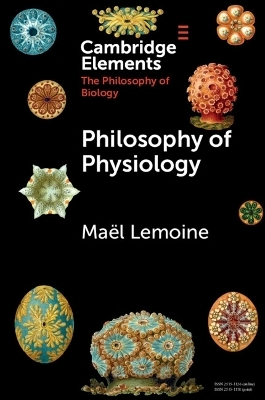
Philosophy of Physiology
Seiten
2025
Cambridge University Press (Verlag)
9781009370370 (ISBN)
Cambridge University Press (Verlag)
9781009370370 (ISBN)
This Element, philosophy of physiology, challenges the foundational concept of health and disease in philosophy of medicine, embracing the exploration of the healthy and pathological aspects of life. This philosophy identifies and clarifies various theories of disease and health, posing a new question about the unity of pathological phenomena.
Time is ripe to complement the question 'what is health and disease?' in philosophy of medicine with a 'philosophy of physiology.' Indeed, the actors in this debate share the conviction that a 'foundational' concept dictates to this scientific field what is to be considered healthy or pathological and leaves it to explore only facts and mechanisms. Rejecting this presupposition, philosophy of physiology accepts that biomedical sciences explore and redefine their own object: the healthy, the pathological. Indeed, various theories of disease and health, that philosophers have rarely studied, form the core of biomedical research, too hastily considered as a science 'without theories.' The Element identifies them, and clarifies their content, presuppositions, and scope. Finally, it proposes a new question about the unity of the pathological phenomenon: not 'what do all diseases have in common?' but rather, 'why is the susceptibility to disease a universal and necessary characteristic of living beings?'
Time is ripe to complement the question 'what is health and disease?' in philosophy of medicine with a 'philosophy of physiology.' Indeed, the actors in this debate share the conviction that a 'foundational' concept dictates to this scientific field what is to be considered healthy or pathological and leaves it to explore only facts and mechanisms. Rejecting this presupposition, philosophy of physiology accepts that biomedical sciences explore and redefine their own object: the healthy, the pathological. Indeed, various theories of disease and health, that philosophers have rarely studied, form the core of biomedical research, too hastily considered as a science 'without theories.' The Element identifies them, and clarifies their content, presuppositions, and scope. Finally, it proposes a new question about the unity of the pathological phenomenon: not 'what do all diseases have in common?' but rather, 'why is the susceptibility to disease a universal and necessary characteristic of living beings?'
1. From philosophy of medicine to philosophy of physiology; 2. Disease entities and pathophysiological processes; 3. How generalizable are disease theories?; 4. Toward a theory of the pathological phenomenon; 5. Toward a theory of physiological health; 6. Conclusion; references.
| Erscheinungsdatum | 08.11.2022 |
|---|---|
| Reihe/Serie | Elements in the Philosophy of Biology |
| Zusatzinfo | Worked examples or Exercises |
| Verlagsort | Cambridge |
| Sprache | englisch |
| Maße | 152 x 229 mm |
| Gewicht | 141 g |
| Themenwelt | Geisteswissenschaften ► Philosophie |
| Studium ► 1. Studienabschnitt (Vorklinik) ► Physiologie | |
| Studium ► 2. Studienabschnitt (Klinik) ► Pathologie | |
| ISBN-13 | 9781009370370 / 9781009370370 |
| Zustand | Neuware |
| Informationen gemäß Produktsicherheitsverordnung (GPSR) | |
| Haben Sie eine Frage zum Produkt? |
Mehr entdecken
aus dem Bereich
aus dem Bereich


